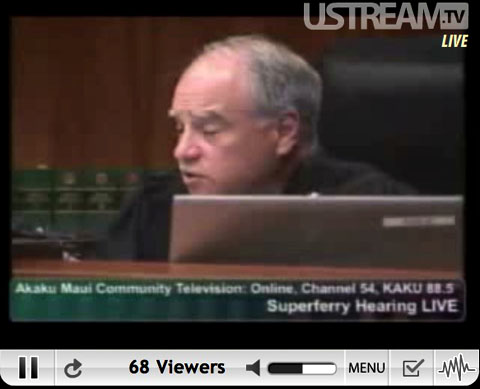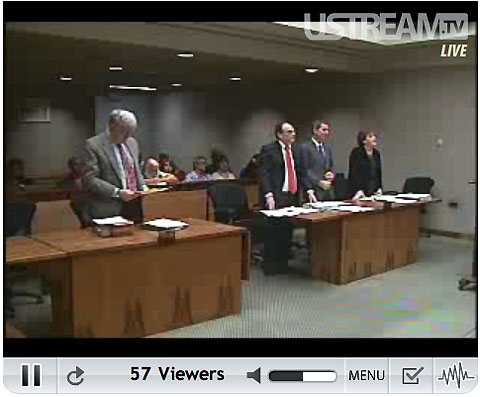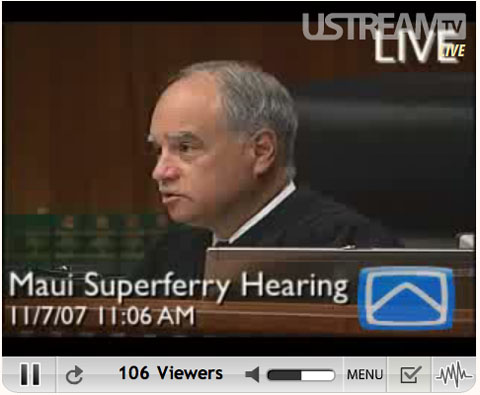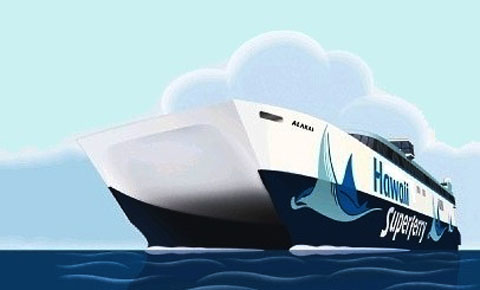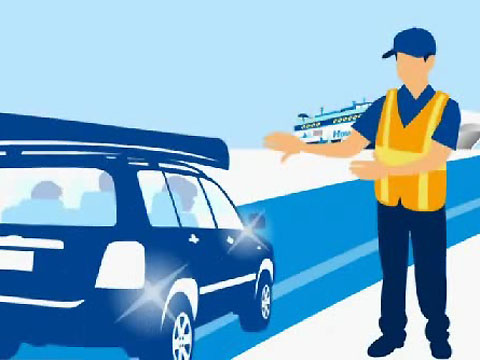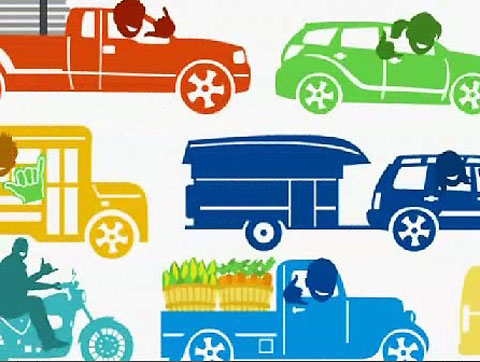by Harry Eager on 6 November 2007 in The Maui News
Gov. Linda Lingle has signed Act 2, which could get the Hawaii Superferry moving again. But while the ferry Alakai may be a high-speed vessel, the legal system takes longer to change course.
On Oct. 9, 2nd Circuit Judge Joseph Cardoza ordered the ferry not to use Kahului Harbor until an environmental assessment is done. But the written findings of fact, conclusions of law, and decision and order have not been completed.
Deputy Attorney General William Wynhoff said Monday that formally the state cannot ask a court to dissolve an injunction that has not been issued. That did not prevent the state Department of the Attorney General from submitting a motion to dissolve Cardoza’s order on Monday, but the state could risk more delays.
The state, Hawaii Superferry and its opponents – the Sierra Club, Maui Tomorrow and Kahului Harbor Coalition – will be back in Cardoza’s 2nd Circuit courtroom at 10:30 a.m. Wednesday to discuss how soon to argue about keeping or dissolving the injunction.
Wynhoff said the state does not contest that the injunction is valid, only that the paperwork is not processed yet because there remain some issues of fact unsettled.
Along with his motion to dissolve the injunction, Wynhoff filed a request to speed up the process.
Rules of procedure give parties in a lawsuit 18 days to respond to motions.
Attorney Isaac Hall, who represents plaintiffs seeking environmental studies before the Superferry sails, said Monday he will object to hurrying along the hearing.
“It’s a substantial motion,” he said. “There are substantial objections” to both the new law and to the conditions imposed by Lingle to mitigate environmental impacts.
“I don’t know what the judge is going to do . . . but I don’t see any reason for rushing through the process,” he said.
In a letter transmitting an executive order setting conditions for ferry service, Lingle listed 40 provisions that Hawaii Superferry must comply with. Wynhoff’s memorandum says Superferry has complied or agreed to comply with all of them.
Therefore, Wynhoff argues, the Circuit Court must dissolve its injunction, as the law it was based on is no longer in effect.
What was against the old law up to November 2nd is no longer illegal.
He cites a Maui case involving UFO Parasailing in which a court threw out a state law designed to prevent parasail business off Kaanapali during whale season.
The U.S. Congress changed the law, and the state court then vacated an injunction based on the old law. The parasailers were stopped from operating during whale season.
In this instance, the state is trying to allow a business to resume, but Wynhoff says the legal argument is exactly parallel.
The conditions imposed by the governor – which can be changed based on actual experience – do not differ greatly from the operating plans that Superferry had proposed to follow.
Among the changes are a ban on transporting rocks, soil, dirt or dead coral (with limited exceptions where Department of Agriculture permits are issued).
This prohibition would head off what Wynhoff called an “unfortunate incident,” when three pickup trucks of rocks were loaded on Maui for transport to Oahu.
The state Department of Land and Natural Resources’ Division of Conservation and Resources Enforcement intercepted the rocks and confiscated the trucks. It was suspected that the rocks were destined to line an imu.
Another condition, not anticipated in Superferry’s original plans, is a ban on transporting human bones, or iwi. Also, fishing nets are banned, and the company must notify passengers that valid hunting licenses are required to hunt. Also, lobsters, opihi and crustaceans are prohibited.
These restrictions will address claims that Oahu city dwellers will flood the Neighbor Islands to plunder its rocks, shellfish and wild pigs.
The ferry company already had plans to survey and intercept plant materials (unless inspected and cleared by the Agriculture Department). The governor’s conditions also require passengers to declare whether they are carrying any plants or “other biological medium.”
An apparently large change is a directive imposing a speed limit within the Hawaiian Islands Humpback Whale National Marine Sanctuary during whale season.
However, Superferry says it planned to stay out of the sanctuary during whale season, except in unusual circumstances.
Lingle’s condition restricts speed within the sanctuary to 25 knots. Hall’s expert witness, Greg Kaufman of the Pacific Whale Foundation, had insisted that anything over 13 knots was too fast. (The ferry’s cruising speed is 37 knots, or about 42 mph.)
The governor also sets whale season as Jan. 1 to April 30, a later start and an earlier finish than Hall’s experts had called for.
The governor also directs the completion of traffic studies. The state Transportation Department was already under such an order from 2nd Circuit Judge Joel August for Kahului, but now Superferry or the state will have to provide traffic counts and projections at all ports of call.
Some of the governor’s provisions are conditional, such as to “consider adding a cultural briefing on Hawaii’s cultural and natural resources as part of its onboard education program.”
Another condition was to have Superferry ask the National Marine Fisheries Service (NMFS) to provide trained whale spotters for the bridge. Superferry already had planned to have two dedicated whale spotters of its own.
Even before the Superferry bill was passed, the NMFS’ parent, the National Oceanographic and Atmospheric Administration, had said it didn’t have any spotters to lend, but the governor now asks that graduates of Alu Like’s Marine Stewardship Program be used to “monitor marine life.”
Lingle spokesman Russell Pang said that idea came from the Office of Hawaii Affairs, one of several places where Lingle sought suggestions for mitigation. (See list below.)
In her message, Lingle said she knows not everyone will be happy with the conditions, “but the decisions I have made clearly represent a good faith effort to include meaningful conditions that don’t seriously hamper the ferry’s chance to succeed.”
Irene Bowie, executive director of Maui Tomorrow Foundation, said the group “is extremely disappointed with Governor Lingle’s executive order.”
“When we agreed to meet with the governor last Thursday, we went in good faith to discuss meaningful mitigation measures. We gave her a list of 12 conditions we felt were absolutely necessary,” Bowie said. “Today we feel the governor chose not to hear us. . . Most disappointing is the dismissal of conditions to slow Hawaii Superferry down to 13 knots in 100-fathom waters during the winter months.
“We will now go forward in asking that the injunction preventing Hawaii Superferry from using Kahului Harbor remain in place,” she said.
Jeff Mikulina, director of the Hawaii chapter of the Sierra Club, said the governor’s restrictions were insufficient to protect the environment, pointing out that the governor’s speed limit in whale areas is about half of what environmentalists recommended.
“We think that’s exposing not only the whales to fatal strikes, but passengers could be subject to injury if they strike a whale,” Mikulina said.
Also, he said he would have preferred vehicles boarding the ferry be subject to an undercarriage wash to reduce the risk of them carrying invasive species.
“We were hoping at least the conditions would be at least extra cautious during this period while they do the environmental review, but it appears they fall a bit short,” he said.
Superferry President John Garibaldi, who was traveling on the Mainland, issued a statement saying: “We appreciate Governor Lingle’s and the Legislature’s timely action of signing into law a bill that allows Hawaii Superferry to operate while the state conducts an environmental impact statement.
“Hawaii Superferry believes that the operating conditions outlined by the governor are reasonable and fair under the current circumstances,” he said.
The state’s motion says it is settled law that a legislature can change a law, in the words of the Hawaii Supreme Court, “to meet the needs and demands of changing times and legislate accordingly.”
That addresses the objection that the special session of the Legislature, under the prodding of the executive branch, had usurped the prerogatives of the judicial branch. The Hawaii Supreme Court in August overruled the 2nd Circuit Court and said that an environmental assessment must be undertaken.
Hall then argued, successfully, after a monthlong hearing, that the assessment had to precede the resumption of ferry operations.
Act 2 specifically allows the operation of a “large-capacity ferry” to proceed simultaneously with an environmental study of the ferry’s sailings.
The state memo also sought to deal with objections that Act 2 gutted or set aside Act 343, the state’s environmental review statute.
The state has in the past “often acted to exempt specific projects or categories from the environmental review process,” the memo says.
The memo cites the purchase of the Waiahole water system, a 1998 law passed to make it easier to restore Hawaiian fishponds, and the legislation that finally enabled the completion of the H3 highway on Oahu.
That leaves the constitutional question. Hall says this remains unsettled, because, as he told Cardoza, the people have a right to a public review process of the impacts.
The Wynhoff memo says the Circuit Court must grant a legislative act an assumption of constitutionality. The plaintiffs could pursue a constitutional appeal, it admits.
But, it says, the court cannot delay granting the motion to dissolve while the appeal to the higher court is pursued.
CONDITIONS FOR SUPERFERRY
Highlights of specific conditions for Hawaii Superferry include requirements to:
Post
two whale lookouts and request
the National Marine Fisheries Service
to help identify whale observers,
such as graduates and members of
Alu Like’s Marine Stewardship
Program. The lookouts would be
onboard to monitor marine life
and warn the ship’s crew
in time to prevent collisions.
Avoid
operating within the Hawaiian Islands
Humpback Whale National Marine
Sanctuary or in waters less than
100 fathoms deep from Jan. 1 to
April 30, except in instances that
are in the interest of the safety
or comfort of passengers.
Observe
a speed limit of no more than 25
knots if the ferry were to travel
in the marine sanctuary.
Stay
at least 500 meters from any sighted
whales.
Agree
to use radar, night-vision equipment
and bow-mounted cameras to detect
whales and avoid collisions. (The
night-vision equipment would affect
the Oahu-Kauai trip, since the
Oahu-Maui voyages are scheduled
during the day.)
Document
and report any whale collision
or whale approach of less than
100 meters from the vessel.
Conduct
agricultural screenings and inspections
of passengers and all vehicles,
including visual inspections of
engines, interiors, undercarriages,
wheel wells, trunks and beds of
pickup trucks. Vehicles that are
excessively muddy or that have
prohibited items will be turned
away, or the prohibited items taken
away.
Notify
passengers in advance that all
vehicles, camping, hiking, hunting,
diving, snorkeling, fishing and
boating equipment should be thoroughly
washed and free of debris.
Ban
living plants and propagative plant
parts, such as roots and root stock,
that are not accompanied by a state
Department of Agriculture certificate
of inspection.
Require
passengers to declare all plants,
fruits and seeds, and permit inspections
of such items by the Department
of Agriculture.
Consider
establishing a special transport
rate for agricultural products.
Prohibit
the transport of logs, cut trees,
and tree limbs.
Ban
the transport of rocks, soil, sand,
dirt, or dead coral, except for
soil or dirt in potted plants inspected
and cleared for transport by the
Department of Agriculture.
Ban
the transport of opihi, lobster
or other crustaceans, and fishing
nets of all kinds.
Prohibit
the transport of iwi, or human
bones.
Provide
passengers with information concerning
restrictions on the use of cultural
and natural resources, including
hunting and fishing rules and camping
permit requirements.
Consider
adding a cultural briefing on Hawaii’s
cultural and natural resources
as part of its onboard education
program.
Comply
with all state water pollution
laws, rules and regulations, and
refrain from discharging wastewater
into the ocean.
Conduct
complete traffic studies and implement
a vehicle movement and management
plan for each port of operation
as directed by the state Department
of Transportation. The traffic
studies will be used to adjust
vessel arrival and departure schedules
as necessary to lessen the impact
of arriving cars on local traffic.
Employ
trained staff to manage traffic
entering and exiting each port
terminal facility, and post security
guards or off-duty police officers
to direct traffic and control signals
to minimize traffic problems.
Cooperate
with any risk assessment conducted
by or authorized by the departments
of Transportation and Agriculture.
|
|
